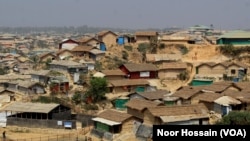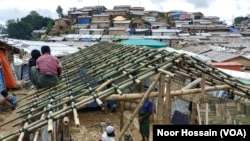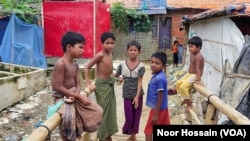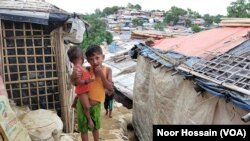At least seven Rohingya refugees were killed in Bangladesh in recent days, as an International Criminal Court prosecutor visited the refugee camps to obtain testimony as part of its genocide investigation against the Myanmar military.
Six of the victims were killed Friday. Five of them, all members of the Arakan Rohingya Salvation Army, a Rohingya insurgent group, were killed in a gunfight with members of the rival Rohingya Solidarity Organization Friday morning. The sixth, Mohammad Sanaullah, an RSO supporter, was found with his throat slit. His relatives alleged to police that he was killed by ARSA insurgents.
The seventh man, Mohammad Ebadullah, 27, a junior refugee camp warden who was gathering refugees to testify before the ICC prosecutor, was stabbed to death Thursday, an hour before prosecutor Karim Asad Ahmad Khan reached the camp to interview witnesses to 2017 violence in Myanmar.
None of the victims had spoken to the prosecutor.
However, Hong Kong-based Bangladeshi rights activist Mohammad Ashrafuzzaman told VOA that Ebadullah’s murder just before Khan’s visit and the five others immediately after his departure are highly concerning.
"The Rohingya refugee camps in Cox’s Bazar are highly securitized. The Armed Police Battalion [a Bangladesh police wing providing security to the Rohingya refugee camps in Cox’s Bazar] of the country controls the entire camp areas. The other security forces such as the Border Guards-Bangladesh, Rapid Action Battalion, the armed forces, are there in the vicinity, too. The intelligence agencies have high presence within the refugee camps," Ashrafuzzaman told VOA.
"In such condition, how assassinations can be committed, that question must be addressed with higher priority."
Ebadullah's killing was certainly linked to the interviews with the ICC prosecutor because he was marshalling witnesses to the 2017 anti-Rohingya violence, Ashrafuzzaman added.
"At least Ebadullah's murder certainly raises many questions. Who wants to benefit by preventing the paths to justice for the Rohingya refugees at the ICC court? Who provokes and patronizes hate campaign against the Rohingya refugees in Bangladesh?
“Investigators have to work hard and find out those enemies of the Rohingya refugees," he said.
Insurgent groups’ involvement confirmed
Amir Jafar, a deputy inspector general commanding the local Armed Police Battalion, confirmed that ARSA and RSO members were involved in Friday’s gunfight.
“All five killed in the gunfight were active members of ARSA. Two of them were the group’s commanders. The ARSA men were climbing down a hillock in a camp when the armed RSO members, lying in wait, launched the gun attack on them. Three died on the spot and two others died later in a hospital,” Jafar told VOA.
“The two Rohingya groups have long been fighting over the control of different areas of the refugee camps in Bangladesh,” he said.
ARSA, a Rohingya insurgent group, was active in Myanmar’s Rakhine state for years before authorities declared it a terrorist organization in 2017. The group said the terrorism declaration was baseless and that it was only fighting for the rights of the Rohingya.
After more than 700,000 Rohingya fled to Bangladesh following a military crackdown in Myanmar in 2017, many ARSA members have been based in the refugee camps of Cox’s Bazar. The group was charged with the 2021 assassination of Rohingya community leader and human rights defender Mohibullah, who only uses one name. It has also been alleged by Rohingyas that ARSA is linked to groups involved in drug trafficking, extortion and other crimes in Bangladesh – charges denied by ARSA..
Rohingya insurgent group and political organization RSO was founded in Myanmar in 1982, largely to fight the oppression of the minority Muslim community by the military in the country. In the 1990s, the group shifted its base to Bangladesh and began operating as a Rohingya group in exile.
In 1998, the group gave up armed rebellion. However, in 2021, after Myanmar’s military took power in a coup, the RSO announced the group’s rearmament. RSO, which is active with its armed members in the Cox’s Bazar camps, blames ARSA for violent attacks against many refugee leaders and staunchly opposes the group.
Since 2020, Rohingya camps in Bangladesh have witnessed many violent incidents, including the killing of refugees. The police and Rohingya rights activists blame ARSA and RSO for most of those violent incidents.
According to Jafar’s office, the number of homicides of Rohingyas in Bangladesh has risen since 2021. In that year, 30 Rohingyas were killed in Bangladesh; in 2022, that number rose to 32.
This year, at least 57 Rohingyas have been killed, according to figures provided by the police and Rohingya activists. Among those killed this year, 17 were camp wardens, 16 were ARSA members and two were from RSO.
Home Minister Asaduzzaman Khan said some separatists from Myanmar might have infiltrated the Rohingya camps in Cox’s Bazar.
“I guess, those separatists are triggering violence in the camps and killing people and committing other crimes. We are reinforcing our border patrol in our effort to stop their infiltration,” the minister said Friday.
“We have to repatriate Rohingyas to Myanmar as soon as possible. It will be good for all— them and us.”







